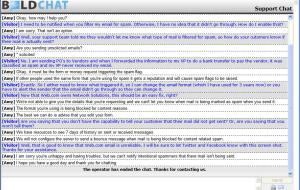Good advice. “@sengineland: How Large Multi-Location Businesses Can Dominate In Local Search selnd.com/1qIcmHO“
Are Facebook Ads a Waste of Money?
Is Facebook Wasting Your Ad Budget?
Are you wasting your money using Sponsored advertising on Facebook? How can a Facebook ad get any positive results when users hate them and Trollers love to comment on them? Lets look further.
Facebook gathers a huge amount of data about us giving businesses and brands the opportunity to provide ads that we really want to see. They try this approach on Sponsored ads to your friends (and friends of friends) and people with common likes.
A niche business may find interested users who will click on their ad to find out more information. But from our review of comments on Sponsored ads, the ROI on the ad seems negligible, if there is any at all. It becomes a field day for Trolls to post and many feel the ads are SPAM on their newsfeed.

Small businesses still seem to be wasting money by ignoring targeting. If you can’t afford a targeted ad, don’t throw money at a sponsored ad. As marketers we really need to hone down our audience and target those who are interested in what we do, those who are likely to spread the word or are likely to buy from us.
The ROI Should be Higher!
The rate at which bots are crawling through everyone’s internet life is incredible. It was reported earlier this year that 60% of 2013 internet traffic was being generated by bots! This includes adbots. The results for 2014 aren’t out yet, but we are betting the percentage is higher.
With so many bots crawling around websites and social media, you would think that computer generated marketing targets could get it right. Yet, many Facebook users continue to be dealt up ads that they have no interest in. Maybe not because the ad isn’t interesting, but because they are on Facebook to be social, either actively or passively. Looking at ads is definitely not why they are there.
Alternative to Facebook Ads
Fighting for attention with Facebook ads seems to be a waste of money. If you want to use Facebook as a marketing tool:
- Invest in creating a great Facebook page for your business by posting good content.
- Work on getting more fans to visit your page and website.
- Build an audience that will promote your business and buy your product.
If you use advertising budget on an ad to promote your website or product, make sure you are targeting the ad to people that are likely to find your product useful. If you are going to spend money on a Facebook ad, get it targeted to a very narrow audience and make it relevant to them.
How USB Memory Sticks Hack Your PC –
BadUSB Malware Code Released!
Turns USB Drives Into Undetectable CyberWeapons!
USB is now a major threat to a large number of people who use USB drives – including USB sticks and keyboards. Security researchers have released a bunch of hacking tools that can be used to convert USB drive into silent Malware installers.
This vulnerability has come about to be known as “BadUSB”, whose source code has been published by the researchers on the open source code hosting website Github, demanding manufacturers either to beef up protections for USB flash drive firmware and fix the problem or leave hundreds of millions of users vulnerable to the attack.
SOURCE CODE AVAILABLE ONLINE TO EVERYBODY
The code released by researchers Adam Caudill and Brandon Wilson has the capability to spread itself by hiding in the firmware meant to control the ways in which USB devices connect to computers. The hack utilizes the security flaw in the USB that allows an attacker to insert malicious code into their firmware.
In a talk at the Derbycon Hacker Conference in Louisville last week, the duo were able to reverse engineer the USB firmware, infect it with their own code, and essentially hijack the associated device. The researchers also underlined the danger of the Bad USB hack by going in-depth of the code.
THE GOOD NEWS AND THE BAD
The good news is that this vulnerability presents itself in only one USB manufacturer, Phison Electronics, a Taiwanese company. But the bad side of it is that Phison USB sticks can infect any given device they are plugged into, and the company has not yet revealed who it manufactures USB sticks for. It is still unclear as to how widespread the problem may be at the moment.
A Phison USB stick can infect any type of computer, but it isn’t clear if its able to infect any other USB device that is plugged into them afterwards or not. However, Phison controllers are found in a very large number of USB thumb drives available on the market.
Once compromised, the USB devices can reportedly:
- enter keystrokes
- alter files
- affect Internet activity
- infect other systems, as well, and then spread to additional USB devices
- spoofs a network card and change the computer’s DNS setting to redirect traffic
- emulates a keyboard and issue commands on behalf of the logged-in user, for example to exfiltrate files or install malware
During their Derbycon demonstration, the two researchers replicated the emulated keyboard attack, but also showed how to create a hidden partition on thumb drives to defeat forensic tools and how to bypass the password for protected partitions on some USB drives that provide such a feature.
MANUFACTURER DENIES THE PROBLEM
Security researchers tried to contact Phison Electronics, the manufacturer of the vulnerable USB devices, but the company “repeatedly denied that the attack was possible.”
We recommend to only use YOUR own USB memory stick on YOUR computer. Don’t use your memory stick in someone else’s computer and don’t let someone else put one in your computer.
Thanks to The Hacker News for the article.
Enjoying fast #WIFI at #Starbucks in #Portland. Ea…
Enjoying fast #WIFI at #Starbucks in #Portland. Easy place to work from while visiting. speedtest.net/my-result/3796… #speedtest
Email Support Issues with Web.com
Did Your Email Really Get Sent?
One of our customers hasn’t finished moving their email off of Network Solutions servers, yet. An employee was having an issue sending his Vice President an email with an invoice attached. The VP was not receiving the email, and neither was anyone else in the company. It was in the users “Sent” folder, but it never really left the mail server.
Spam Filters Prevent Sending Legit Email
Our research indicated that each time the user sent the email, it must have been going into the mail servers spam folder and was never being sent out. The user contacted Network Solutions via their phone support and was told, indeed, it was going into spam and not being sent. He asked for a solution and the agent assigned a support number and said he would hear back in a couple of days.
You Don’t Know if Your Email is Sent
Sent
An email arrived the next day and Network Solutions basically told the user it was his problem. We linked up to the support chat and found out that although there is the capability of bouncing the spam back to the sender so they know it didn’t go out, they won’t do it. So if you use Network Solutions (a Web.com company) email, you may never know if your email is really sent or not.
We don’t think this is a viable network solution.

